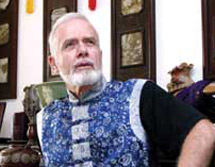Elements of Style 

 For fixing China’s English, David Tool makes no apologies. “Some of the American media, even the Italian media, they say, ‘why are you doing that? You’re ruining all the fun.’” They might just have a point. In years past, signs with such gems as “Racist Park” (the Minorities Park) and “speaking English only” (a sign at a local school) have tickled Beijing’s foreigner community with even more linguistic folly than a press conference on the White House lawn. But thanks to the work of Tool, a 65-year-old professor at Beijing Foreign Studies University and the city government’s unofficial grammarian, that’s changing. He’s just, for instance, helped complete a list of 2,743 recommended dish translations for the city’s restaurants. Tool’s Chinese name, Du Dawei, or Lao Du, as he is called in meetings with city officials, dignitaries and Tsinghua advisers, means to “prevent” or “put an end to.”
For fixing China’s English, David Tool makes no apologies. “Some of the American media, even the Italian media, they say, ‘why are you doing that? You’re ruining all the fun.’” They might just have a point. In years past, signs with such gems as “Racist Park” (the Minorities Park) and “speaking English only” (a sign at a local school) have tickled Beijing’s foreigner community with even more linguistic folly than a press conference on the White House lawn. But thanks to the work of Tool, a 65-year-old professor at Beijing Foreign Studies University and the city government’s unofficial grammarian, that’s changing. He’s just, for instance, helped complete a list of 2,743 recommended dish translations for the city’s restaurants. Tool’s Chinese name, Du Dawei, or Lao Du, as he is called in meetings with city officials, dignitaries and Tsinghua advisers, means to “prevent” or “put an end to.”
Indeed, at well over 6 feet, with his imperial white beard lining a chiseled jaw, silk Mandarin jacket and slight South Carolinian twang, Prof. Tool is not the sort of person with whom you want to make light of English malapropisms. And yet even he sometimes has to admit that, yes, the material he’s working with is pretty good stuff. “‘The Dongda Anus Hospital’ is funny. ‘Garden of Curled Poo.' ‘Don’t fall down.’ All those things,” he says, over plates of sushi at Wangfujing.
The humor, he is relieved to know, is not the result of some cultural arrogance. “For us Americans or British, its verbally funny, not culturally funny. We’re laughing at the language,” he says. “But often the Chinese don’t hear that. And I just want to clear that up. I don’t want the laowai to look insensitive culturally. I don’t want that situation,” he says, “a bunch of asshole Americans standing in front of the anus hospital having their picture taken.”
After having a laugh, it’s common procedure for foreigners to wonder how sign language like “On the taxi the guest stands forward” could ever get past the authorities. Some might even for a moment consider filing a complaint. But Tool, a former Army colonel, assistant dean at the University of Southern California, and an avid lover of Chinese culture, will not stand idly by. When he’s not teaching nearly 300 university students, writing a cultural guide to the city or lobbying for the city’s elderly and handicapped, the professor is known to regularly stop into shops to inform shopkeepers, in the best Chinese he can muster, about their bad signage. It was a visit by him last year to Dongda hospital that led to the hospital’s name change. “We’re talking about a huge sign—the letters are bigger than me. But within a week they changed it. Even the common man on the street is appreciative.” On more than a few occasions of store-wide language sweeps, other shoppers have even given him the thumbs up.
Tool’s syntactical crusade began in October 2001, with a letter he wrote to the Ministry of Culture, after seeing a Peking opera in Xi’an. Tool’s attempts to enjoy the hijinks of the Monkey King were foiled as much by the translation (“there were ‘auspicious clods’ in the sky instead of “‘auspicious clouds’”) as by a group of Germans laughing loudly in the audience.
“My first reaction, was, this must be really embarrassing to the Chinese, as opera is one of the highest art forms in China,” recalls Tool, who has spent 11 years in China. “The bigger issue is how can the laoban, the management of this theater be so thoughtless as to present their own culture in such a careless way?”
 Tool wrote to the government that he would go to any cultural institution and correct English for free. To his surprise, they replied: “‘We’ll let you go to the museums,’ they said, ‘but first how about first doing the subway?’” Soon after came the ring roads. Then the city’s cultural sites. A committee was formed, Beijing Speaks Foreign Languages Committee. A retreat last year resulted in six heavy manuals, covering signs for everything from transportation to hospitals to Olympic venues.
Tool wrote to the government that he would go to any cultural institution and correct English for free. To his surprise, they replied: “‘We’ll let you go to the museums,’ they said, ‘but first how about first doing the subway?’” Soon after came the ring roads. Then the city’s cultural sites. A committee was formed, Beijing Speaks Foreign Languages Committee. A retreat last year resulted in six heavy manuals, covering signs for everything from transportation to hospitals to Olympic venues.
When someone once mentioned the city’s menus, Tool balked at the idea. “That’s too big an issue,” he says. But not wanting to confuse Olympic visitors (“Wikipedia chicken,” anyone?), last year the authorities ordered a sprucing up of dish translations. “We’ve gone through 189 pages of menu items twice,” says Tool, with no small tinge of exhaustion in his voice after last month’s final discussion about the list. Between controversies over direct translations (“fish-flavored pork”) versus more poetic ones ("Hunan style pork"), and the use of French phrases (“shrimps with leeks” or “shrimps en casserole”), it was a tiring process, with a few too many cooks in the kitchen.
But at the end of the day, cleaning up phrases like “hot steamed crap” – for the good of China – is one of Tool’s loves. “Most Chinese think I’m a fool because I do this for free,” he says. “And I do feel underappreciated sometimes. But if you are doing something just because you want praise, you probably aren’t doing it for the right reason,” he says. “If people don’t appreciate it, that doesn’t lessen the value of what I’m doing.”


 For fixing
For fixing  Tool wrote to the government that he would go to any cultural institution and correct English for free. To his surprise, they replied: “‘We’ll let you go to the museums,’ they said, ‘but first how about first doing the subway?’” Soon after came the ring roads. Then the city’s cultural sites. A committee was formed, Beijing Speaks Foreign Languages Committee. A retreat last year resulted in six heavy manuals, covering signs for everything from transportation to hospitals to Olympic venues.
Tool wrote to the government that he would go to any cultural institution and correct English for free. To his surprise, they replied: “‘We’ll let you go to the museums,’ they said, ‘but first how about first doing the subway?’” Soon after came the ring roads. Then the city’s cultural sites. A committee was formed, Beijing Speaks Foreign Languages Committee. A retreat last year resulted in six heavy manuals, covering signs for everything from transportation to hospitals to Olympic venues. 
No comments:
Post a Comment